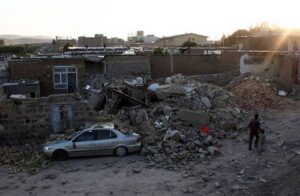
Afghanistan will compete with Pakistan, Qatar, Malaysia, and Nepal in the election of the UN Human Rights Council to acquire one of the four places that is set for Asian countries in the UN HRC. The quotas of Asian countries in the UN Human Rights Council are four seats currently held available to Bangladesh, Indonesia, Qatar and India. This election will be held next Monday on the 23rd October 2017 and the winner will take office in Geneva, Switzerland from 2018-2020.
The United Nations Human Rights Council (UNHRC) is the arm of the Human Rights body of the UN which is the most important and main body of the inter-governmental body of UN responsible for addressing situations of human rights.
This organization is located in the United Nations Commission on Human Rights and was created in 2006 following the reform of the Secretary General of the United Nations, Mr. Kofi Annan.
According to Resolution No. 60/251 of the General Assembly of the United Nations, UNHRC is composed of 47 United Nations Member States elected by direct and secret elections by a majority of the members of the General Assembly of the UN. Each member country has a right to vote in this election.
The members of the Human Rights Council are elected on the basis of the principle of geographical equality. African continental quota 13 seats, Asian continental quota 13 seats, Eastern Europe quota 6 seats, Latin America and Caribbean 8 seats, and Western and other countries’ quotas are 7 seats.
The elected member holds the seat for three years and can nominate himself for a consecutive term. In the upcoming elections, Qatar has been nominating for its consecutive term, and Pakistan has also been a member of this council in the past, and for the second time it is nominating itself.
The terms of work of the fifteen members of this council is over at the end of December 2017, and the upcoming United Nations General Assembly elections will follow its seventy-second meeting in order to select new members for this council.
The Council replaces the Human Rights Commission. During its work, the Commission on Human Rights encountered gaps and shortcomings that, at the time of the creation of the Council, were attempted to overcome those gaps and defects so that the Council could operate independently and transparently.
The Council has a duty to monitor the treaties and human rights conventions that have been annexed to them since the adoption of the Declaration of Human Rights. The Council also examines human rights violations in countries and, in cases where systematic and systematic violations of human rights are committed, the Council will determine a special rapporteur to examine the status of human rights in those countries. For example, the council has designated its own special rapporteur to examine the human rights situation in Iran.
The Council also has other tasks, such as advising on human rights, raising the quality of human rights education, holding a meeting on human rights issues, and advising countries on how to improve the human rights situation in international law.
Based on one of the most important mechanisms for the work of the Human Rights Council, called Universal Periodic Review, the United Nations member States are obliged (for the second reporting period every 4.5 years and for the third period every 5 years once) provide a general report on how to implement and fulfill their human rights obligations to this council. By consulting the report, this council will provide necessary advice and guidance to the reporting government on deficiencies, gaps and how to promote human rights situation. In 2014, Afghanistan provided its latest report to the Council and will present its next report in 2019.
Obtaining the Human Rights Council seat in addition to the first major international seat to Afghanistan; it will also bring international credit to Afghanistan so that Afghanistan can bring new experiences in the field of international human rights management and pave the way for other international seats and positions and boost its bargaining power on international issues, and gain a better place in international negotiations and talks.
The importance of obtaining this seat due to international credibility has led many countries, even those who violate human rights, to compete in the upcoming elections.
Achieving this seat will also improve the level of education and human rights law domestically as well. Naturally, the State party has a greater responsibly in terms of respecting and respect for the human rights of its citizens, and calls for greater attention to be paid to the legal status of minorities, women and other vulnerable groups, and seeks to provide a more favorable context for the work of national and international NGOs to improve the situation of human rights. Membership in the Council will provide the Afghan government with additional international support and resources that will undoubtedly have a direct impact on the improvement of the human rights situation of Afghan citizens whose human rights have been violently violated for many years during the civil wars. We hope that Afghanistan, whose people have been victims of human rights violations for a long time, are one of the pillars of this council.
ENDS





